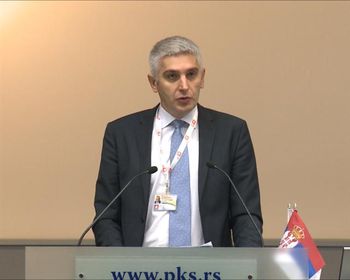- Serbia
Get to know Serbia
- Citizens
Culture and science
Health services
Pension and disability insurance
- Business
Employment
Economy
- Media
- Government
- Contact
Keep in touch
Contact form
Back
Keepin touch
Whether you have a question, comment, suggestion or any problem in the purview of the government, send us your message and we will try to respond as soon as possible. If your problem is not in our purview, we will forward your message to the relevant institution.
Q:
A:
Endorsing principles of UN Global Compact
Belgrade,
18 October 2012
State Secretary of Finance and Economy Vlajko Senic today stated that Serbia must develop a competitive economy and improve exports with the respect of fundamental human rights, environmental protection and continued fight against corruption.
At a local European network regional meeting of the United Nations Global Compact (UNGC) which concerned the sustainability in the financial system and the role of local networks in sustainable development and fight against corruption, Senic said that everyone in Serbia must endorse the principles of the UNGC regardless of the economic situation which is perhaps the gravest in the last 12 years.
Despite the economic situation and the Serbian government’s priorities in terms of deficit, debts, non-liquidity, unemployment and GDP decline, we must not neglect our responsibility towards society, towards workers and our environment, Senic noted.
The previous government adopted the National Strategy for Corporate Social Responsibility and an action plan for the implementation of this document, he recalled.
UN Resident Coordinator in Serbia William Infante said that if Serbia wants to be part of the EU, it must synchronise all its values with the EU and accept a moral obligation for such behaviour.
Infante underlined that the Serbian government is committed to combating corruption, as well as that an important step has been made in this respect which is a good message to foreign investors.
Director of the UNGC local networks Valid Nagy said that the goal of the activities in the Global Compact is to establish a globally affirmed framework for development and implementation of corporate social responsibility, stressing that today’s meeting is a good opportunity for networks to share ideas, present good examples of corporate practices and put forward recommendations for state policy in key sustainability areas.
Today’s third meeting of the UNGC European networks, which was held in Serbia for the first time, was attended by over 20 representatives of local networks who agreed that the key issue is investment in green economy, the creation of new jobs and social inclusion.
The UNGC is a voluntary initiative of companies and organisations with over 10,000 members from more than 130 countries, committed to harmonising their business activities with the ten universal principles of corporate social responsibility in terms of protecting human and workers’ rights, environmental protection and fight against corruption.
The Global Compact network in Serbia was formed on 6 December 2007 and it has over 80 members, mostly from the business sector. In 2010 it was declared one of the three best networks in the world, while last year it was commended as an example of good practice and is among the top five networks in terms of the number of activities.
Despite the economic situation and the Serbian government’s priorities in terms of deficit, debts, non-liquidity, unemployment and GDP decline, we must not neglect our responsibility towards society, towards workers and our environment, Senic noted.
The previous government adopted the National Strategy for Corporate Social Responsibility and an action plan for the implementation of this document, he recalled.
UN Resident Coordinator in Serbia William Infante said that if Serbia wants to be part of the EU, it must synchronise all its values with the EU and accept a moral obligation for such behaviour.
Infante underlined that the Serbian government is committed to combating corruption, as well as that an important step has been made in this respect which is a good message to foreign investors.
Director of the UNGC local networks Valid Nagy said that the goal of the activities in the Global Compact is to establish a globally affirmed framework for development and implementation of corporate social responsibility, stressing that today’s meeting is a good opportunity for networks to share ideas, present good examples of corporate practices and put forward recommendations for state policy in key sustainability areas.
Today’s third meeting of the UNGC European networks, which was held in Serbia for the first time, was attended by over 20 representatives of local networks who agreed that the key issue is investment in green economy, the creation of new jobs and social inclusion.
The UNGC is a voluntary initiative of companies and organisations with over 10,000 members from more than 130 countries, committed to harmonising their business activities with the ten universal principles of corporate social responsibility in terms of protecting human and workers’ rights, environmental protection and fight against corruption.
The Global Compact network in Serbia was formed on 6 December 2007 and it has over 80 members, mostly from the business sector. In 2010 it was declared one of the three best networks in the world, while last year it was commended as an example of good practice and is among the top five networks in terms of the number of activities.
-
 Požega, 5 July 2025
Požega, 5 July 2025Section of Pakovraće - Požega highway officially opened
-
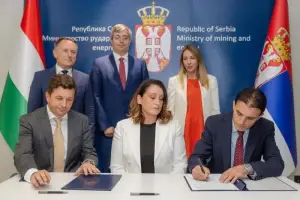 Belgrade, 2 July 2025
Belgrade, 2 July 2025Technical specifications defined for Serbia-Hungary oil pipeline
-
 Belgrade, 30 June 2025
Belgrade, 30 June 2025IMF confirms Serbia successfully implementing all agreed reforms
-
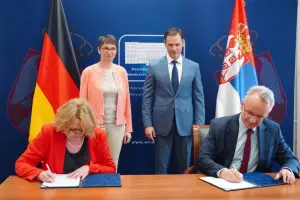 Belgrade, 27 June 2025
Belgrade, 27 June 2025Double Taxation Avoidance Agreement with Germany signed
-
 Kostolac, 25 June 2025
Kostolac, 25 June 2025Construction of Kostolac wind farm nearing completion
-
 Belgrade, 24 June 2025
Belgrade, 24 June 2025Government supports request for new postponement of sanctions against NIS
-
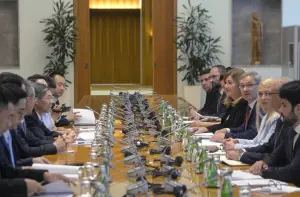 Belgrade, 23 June 2025
Belgrade, 23 June 2025Procedures to facilitate sale of Serbian products to China to be accelerated
-
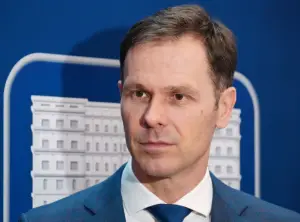 Belgrade, 21 June 2025
Belgrade, 21 June 2025Serbia receives first funds under Growth Plan for the Western Balkans
-
 Belgrade/Cairo, 20 June 2025
Belgrade/Cairo, 20 June 2025New phase in relations with Egypt in field of agriculture
-
 Belgrade/Athens, 18 June 2025
Belgrade/Athens, 18 June 2025Serbia’s leadership position in power sector

